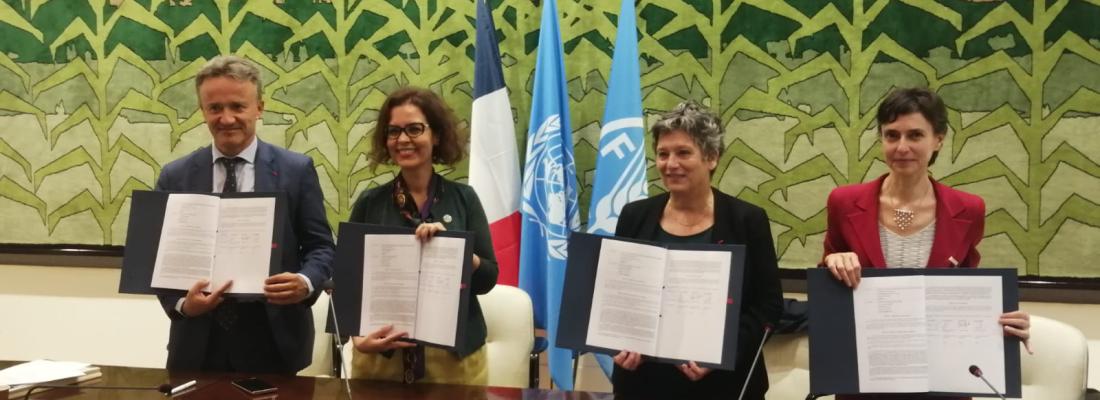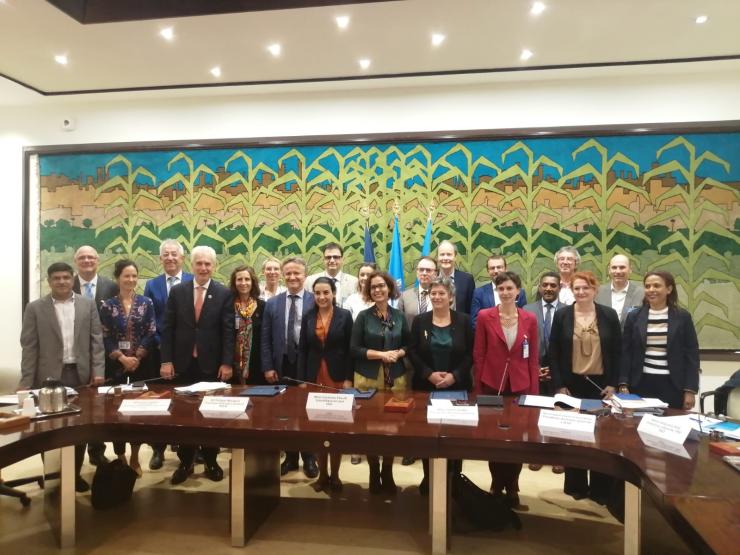October 18, 2022
On 18 October, on the occasion of its Science and Innovation 2022 Forum* in Rome, the Food and Agriculture Organization of the United Nations (FAO) signed a Memorandum of Understanding with three French Research Institutes, INRAE, CIRAD and IRD, in order to continue their collaboration to support agrifood systems’ transformation for the five year period from 2022 to 2027.
This cooperation agreement conveys a strong desire to develop international partnerships to tackle the challenges of climate change, biodiversity, sustainable management of natural resources and the transformation of agrifood systems. The three French research institutes are building up and mobilising their partner networks around the world.
 illustration New cooperation agreement between FAO and INRAE, CIRAD and IRD to support the transformation of agrifood systems © FAO
illustration New cooperation agreement between FAO and INRAE, CIRAD and IRD to support the transformation of agrifood systems © FAO
This cooperation agreement is based on the France–FAO framework agreement (2022–25) signed on October 5, 2022 by the French Minister for Europe and Foreign Affairs Ms. Catherine Colonna and FAO Director-General Mr. Qu Dongyu. It was signed by the chief scientist of FAO, Ms. Ismahane Elouafi, and the CEOs of the three research institutes, Ms Elisabeth Claverie de Saint Martin (CIRAD), Mr. Philippe Mauguin (INRAE) and Ms. Valérie Verdier (IRD), in the presence of H.E. Ms. Céline Jurgensen, Ambassador and Permanent Representative of France to FAO, the French delegation, and several FAO officials.
This cooperation agreement is a significant contribution to the Paris Agreement and to achieving the sustainable development goals of the 2030 Agenda. It aligns with the FAO Strategic Framework 2022–31 and supports the Science and Innovation Strategy adopted by the FAO Council during its 170th session in June 2022.

A renewed framework for collaboration between CIRAD, INRAE, IRD and FAO
A special event was held on Tuesday, 18 October, 2022, entitled “Partnership for co-developing research and innovation: sharing experiences from FAO and CIRAD, INRAE & IRD”, organised during the FAO Science and Innovation Forum, provided an opportunity to put the new agreement into context based on cooperation outcomes and opportunities on topics such as: the One Health approach, responsible digital agriculture, agroecology and climate change. A round table discussion covered the challenges of making agricultural and food systems more resilient and sustainable as well as the importance of multi-stakeholder approaches in supporting open innovation and strengthening innovation systems in partner countries.
INRAE, CIRAD and IRD have been cooperating with FAO for several years. This newly strengthened cooperation agreement illustrates the coherence and complementarity of French agricultural, food and environmental research on themes of common interest, including in the intertropical and Mediterranean regions. Such themes include livestock, fisheries and aquaculture, agriculture and water, forests, plant and animal health, soil, agriculture, climate, and biodiversity.
Additional strategic areas were also highlighted during the special event:
- Prevention of zoonoses, especially through the international initiative PREZODE launched by INRAE, CIRAD and IRD as part of the global joint plan of action drawn up in recent months by FAO, UNEP, WHO and OIE;
- Responsible digital agriculture, which will leverage digital solutions to support sustainable agriculture, particularly through the development of agroecology;
- Adaptation to climate change, one of the priorities supported by the FAO Council in June 2022;
- Strengthening the resilience of agrifood systems.
The FAO Strategic Framework 2022–31 and its new Science and Innovation Strategy call for strengthening partnerships with universities and research organisations, especially in developing countries. The aim is to support scientific knowledge sharing and training and foster debates and discussions on emerging themes such as artificial intelligence, microbiome, bioeconomy, digital agriculture, scientific expertise, public policy support, innovation, biotechnology and foresight studies.
Five areas of cooperation
The cooperation agreement includes several provisions on intellectual property rights, publications and personal data management. It proposes five priority areas of cooperation:
- Improving the coherence of food security and nutrition policies and their implementation by States;
- Supporting the transition towards multiple performances (economic, social and environmental) of agrifood systems and territories, in particular to contribute to the creation of decent rural jobs and improve the incomes of family farmers, more particularly through agro-ecological approaches;
- Strengthening health security and the prevention and response to diseases, in the plant, animal and food fields, to contribute to the improvement of global health in a "One Health" approach;
- Enhancing the resilience of vulnerable populations and improving crisis prevention and management, in particular for food crises;
- Contributing to the implementation of FAO’s climate change strategy for the implementation of the Paris Agreement and the FAO biodiversity strategy.
* From 17 to 21 October 2022, FAO hosted its Science and Innovation Forum 2022 at its headquarters in Rome.'